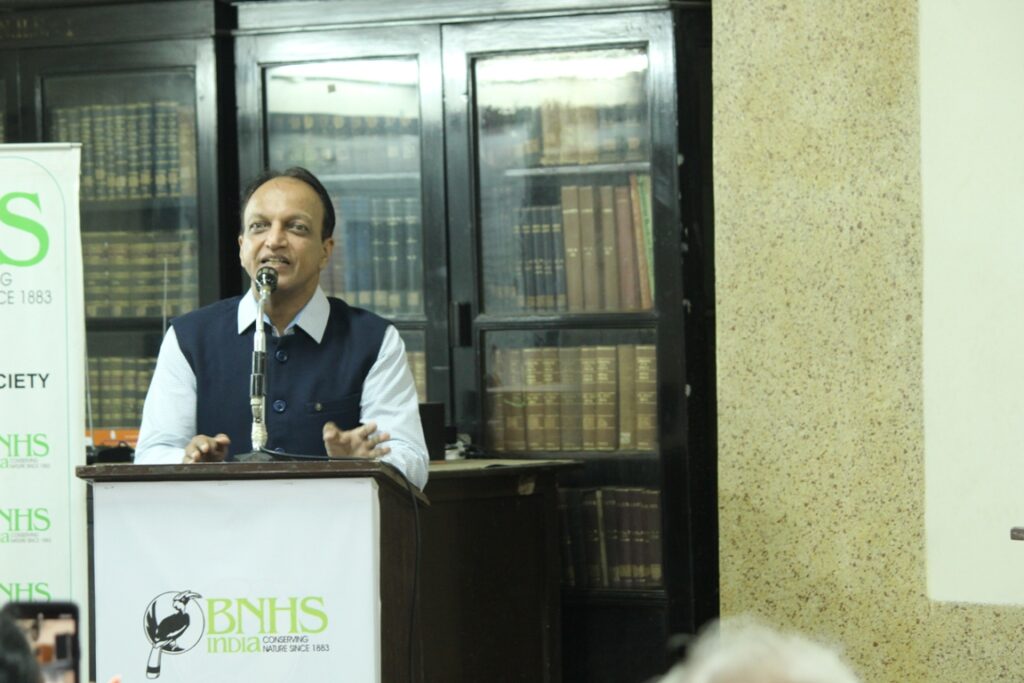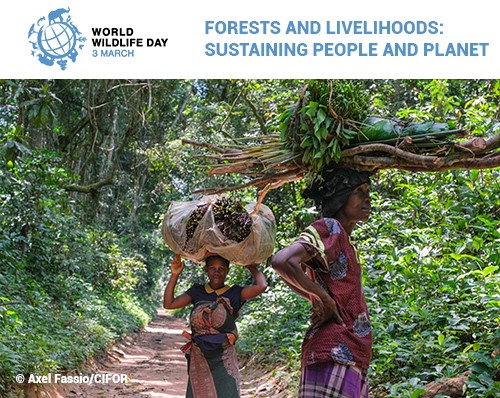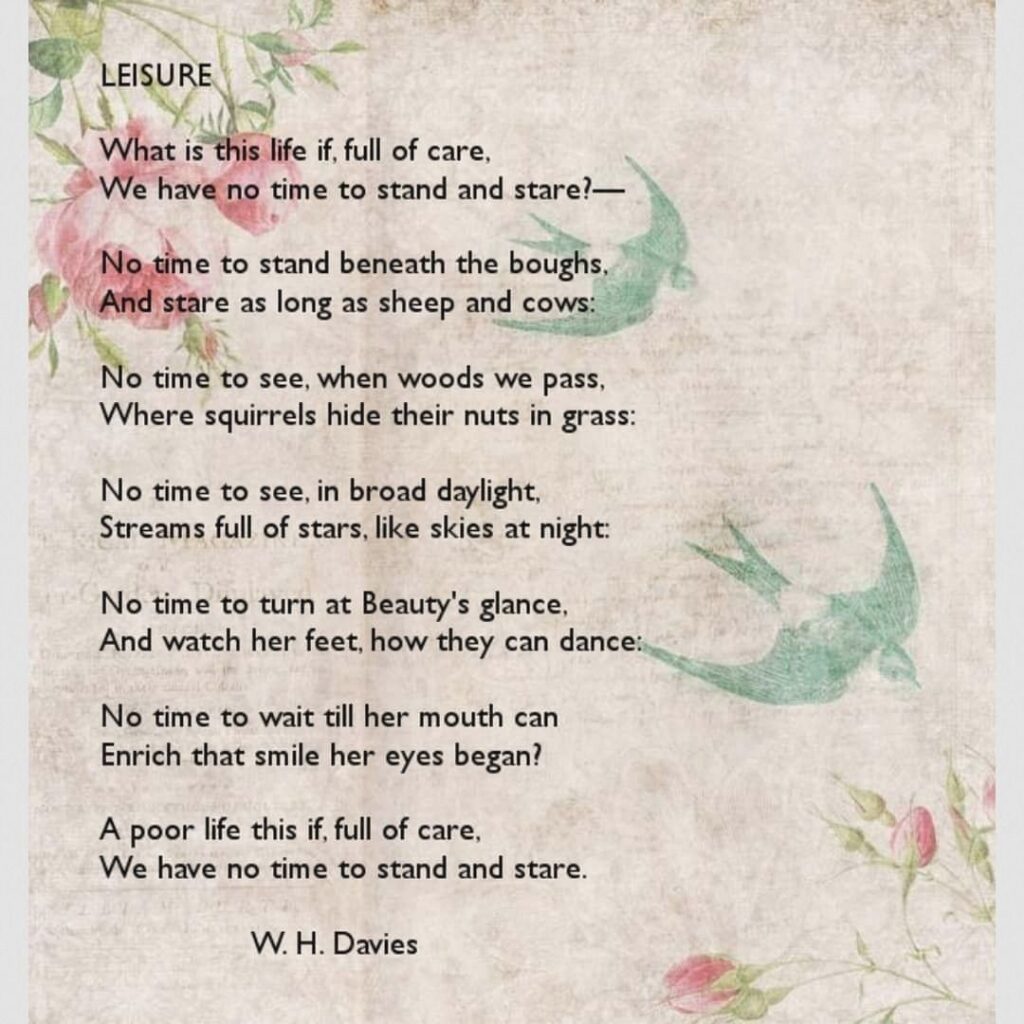March 3, UN World Wildlife Day, aims to celebrate and raise awareness of the world’s wild animals and plants.
This year, 2021 World Wildlife Day will be celebrated under the theme “Forests and Livelihoods: Sustaining People and Planet“, as a way to highlight the central role of forests, forest species and ecosystems services in sustaining the livelihoods of hundreds of millions of people globally, and particularly of Indigenous and local communities with historic ties to forested and forest-adjacent areas.
Between 200 and 350 million people live within or adjacent to forested areas around the world, relying on the various ecosystem services provided by forest and forest species for their livelihoods and to cover their most basic needs, including food, shelter, energy and medicines.
Indigenous peoples and local communities are at the forefront of the symbiotic relationship between humans and forest, forest-dwelling wildlife species and the ecosystem services they provide. Roughly 28% of the world’s land surface is currently managed by indigenous peoples, including some of the most ecologically intact forests on the planet. These spaces are not only central to their economic and personal well-being, but also to their cultural identities.
Forests, forests species and the livelihoods that depend on them currently find themselves at the crossroads of the multiple planetary crises we currently face, from climate change to biodiversity loss and the health, social and economic impacts of the COVID-19 pandemic.

Though most of us know Dr Parvish Pandya as one of the accomplished winners of Season 2, Seniors Have Talent, few are aware that he is Consultant to Sanctuary Asia as Director – Science & Conservation.
Till he retired in 2018, Dr Pandya was professor of Zoology at Bhavan’s College, Mumbai and has shaped and guided innumerable naturalists.
A veritable expert in his field, he has a world of knowledge on all aspects of nature. From birds, plants, mammals, reptiles, forest habitat…. The list goes on!
For over three decades his greatest pleasure has been to share his love and knowledge of nature and spread conservation awareness to citizens’ groups, students and the public at large and he has also held training sessions for officers of the Armed Forces and academicians.
Quintessentially a field man, he believes that the best education is imparted in the forest. A gifted teacher his greatest pride he says is watching his students evolve into naturalists and rational conservationists with the courage to act.
In spontaneous conversation with Deepa Desa, he shares his viewpoints on key aspects of World Wildlife Day 2021.
1- According to the UN, World Wildlife Day on March 3, will be celebrated in 2021 under the theme “Forests and Livelihoods: Sustaining People and Planet” – what is its significance, looking from the lens of India’s perspective?
In the past or should I say recent times, we (the world at large), have separated people out of their biodiversity.
If communities are made responsible for generating livelihoods for people, rozi roti is procured from their land itself. Why would we need to damage this symbiotic relationship? Akin to the famous saying in India, “Jis Thaalee Main Khaate Ho Ched Usi Main Karte Ho” (“Why make holes in the plate that feeds you?”) – this is applicable globally, and not only in India. This was not understood earlier, and it remains the best way to save our forests and their biodiversity.
When people are “using”- in this case I emphasis the word literally – to mean exploiting and using forests, reducing the forests until there is no capital left from the land, you have destroyed the very essence of the land. However, judicious usage, would entail a conservative approach which allows the people to use some part of the forests – Flowers, plants, butterflies, birds, nature at its most pristine can be showcased to tourists – to accrue some gains.
At the Sanctuary Nature Foundation (SNF), I am heading a project called COCOON – Community Owned Community Operated Nature – we are generating livelihoods from sanctuaries, natural habitats, nature parks, forests and helping Indigenous and local communities to earn their livelihoods. In fact, I am just off to Kashmir to do training sessions with the villagers to seek their help to save the biodiversity.
2 – Covid- 19 has impacted every facet of our world. Forests, forest / wild species, the livelihoods that depend on it have also been faced with change. Additionally, we face multiple crises due to the adverse effects of climate change. Do you see light at the end of this deep dark tunnel?
Covid-19 and other pandemics we have seen in civilization, are directly related to illegal global wildlife trade.
When you have live markets where people consume live species of animals, which contain a reservoir of viruses, bacteria and toxins contained in the micro- organisms of their bodies, that are harmful for human consumption.
Having consumed certain domesticated animals. Humans got used to a few species like chicken, goats, etc.- this develops a bit of resistance and immunity to certain amounts of bacteria and virus in the body.
But wild species have unknown viruses and when handled by humans, this leads to a wildfire of infection and disease, we have witnessed from Covid – 19, most recently.
The bottom line is live markets and wet markets must stop.
Several wet markets are at play in India as well, there are several in a garbed disguise, so we don’t even know of their existence. Every pandemic brings huge sacrifices with it. We have lost over a million people as a result of Covid- 19. We have to learn that there are forces bigger than us that we need to respect.
What have we learnt so far? One of our main lessons from this pandemic are that we now need a mask to protect ourselves – but I think about the Jain community – they have always worn masks, they always eat before sunset, they eat the food of nature, they fast (we call it by trending names like 16:8 fasting or intermittent fasting) – the Jains have been following this way of life for centuries. Today we are forced to do exactly what they are doing, in order to stay healthy and protect ourselves.
I proudly can state that because of my deep interest association with wildlife and nature; because I have watched and appreciated birds with stalwarts like Dr Salim Ali, Mr Humayun Abdulali, and so many other leaders of birdwatching in India that today at 62, I don’t need glasses to watch birds closely or even for my mobile phone! This is due to my healthy approach to living.
Forest life, forest bathing, enlivens our organs and systems. For instance, by going deep into the forests, my eyes have become sharper, my ears are increasingly alert to the various sounds of 200 birds, animals etc. I have kept healthy. I will slip in some advice for all seniors – pick up a hobby that develops your sense and promotes well- being and see the difference it makes to your health! My passion for nature drives me to do this work.
3 – Does any personal anecdote strike a chord with you during your tenure as Director – Science and Conservation at Sanctuary Nature Foundation? We would love for you to share it / them.
Personally, I believe that if you take care of yourself, you will be able to take care of others. Everything is so closely interconnected in our lives. The universe contains innumerable synchronicities.
Our actions have an indirect or direct impact upon so many people around us. Think good. Act with integrity. All our karma is not only past birth and future lives but today and in the now. If you keep doing good you will reap the benefits of your actions.
Spread happiness by being genuinely happy, you can thereby infect so many others with your good and positive energy.
I recall this beautiful story of a farmer who was awarded by the American Council, on growing the best quality corn in the world. This same farmer went out and distributed his award-winning seeds to the neighbouring farms. The jury was taken aback and asked him the reason for distributing his seed. He answered that the corn was pollinated by air, if the neighbouring farmers has an inferior variety, it would come back to him, but if he shared his high quality, all the farms would produce the same high quality. I keep sharing this lesson as it is so meaningful.
If you want to be happy, you have to make people around you happy. Shed negative thoughts and emotions, especially guilt. Carrying the burden of guilt equals a wasted life! There is a beautiful poem by W H Davies, called Leisure, and I live every word of this poem. I stop the car; and take the time to watch a beautiful sunset, inhale the fragrance of a flower. If a friend says let’s go to the beach or for a walk, I will stop my work and go, as I respect my friends wish to be in the moment.
Finally, I always recount this story to my students (it’s my favourite!). A teacher asked the class to write what they aspired to become in life. Somebody wanted to be an engineer, another student wanted to become a doctor, yet another a scientist; but one child wrote that he wanted to be happy. The teacher was puzzled and quizzed the boy and asked if he had not understood the essay – the child replied, “I may not have understood the essay Sir, but you, have not understood life!”
I want to share that we can all be happy by just being more aware, more in the present- that is how I am in a constant state of happiness.
4. What simple things can we do to preserve the wildlife and forests that we abode with considering we have managed to damage both considerably?
Let me say this simply – when you wake up in the morning and brush your teeth and look at yourself in the mirror, do a quick exercise of listing your dependencies on nature. Make a note of how your actions (it could be your consumption of anything – from lights, water, paper, plastic, fuel etc.), could be degrading the environment around you and on a larger scale – how the planet has been affected. Find ways to cut back on the resources that you don’t need to utilize so much.
Don’t blindly oppose development (we need power, Wi-Fi etc.) but choose to support projects which take into consideration ways to preserve our wildlife and forests. We need to progress, and development is inevitable but maintaining the sacrosanct state of our wildlife and forests is as important.
Another thing you can do is look up the internet, find the right organisations that are crying sore about the depletion of our forests, diminution of trees, how we have trespassed into the environment of the animals…
Do your due diligence by making informed choices. Support credible NGO’s with a past and present track record of fighting the good fight without vested interests or political motives.
The future well- being of our planet will depend on the healthy co- existence of all aspects.
As we thank Dr Pandya for his invaluable insights, we hope to, as a community, celebrate and promote forest-based livelihoods and seek to support forest and forest wildlife management models and practices that accommodate both human well-being and the long-term conservation of forests, forest-dwelling species of wild fauna and flora and the ecosystems they sustain.
As responsible and accountable humans on the planet, we aspire to abide by the values of traditional practices and seek to empower ourselves with the knowledge that contributes to establishing a more sustainable relationship with these crucial natural systems.





[…] https://seniorstoday.in/other-stories-for-seniors-citizen/forests-and-livelihoods-sustaining-people-… […]
Comments are closed.